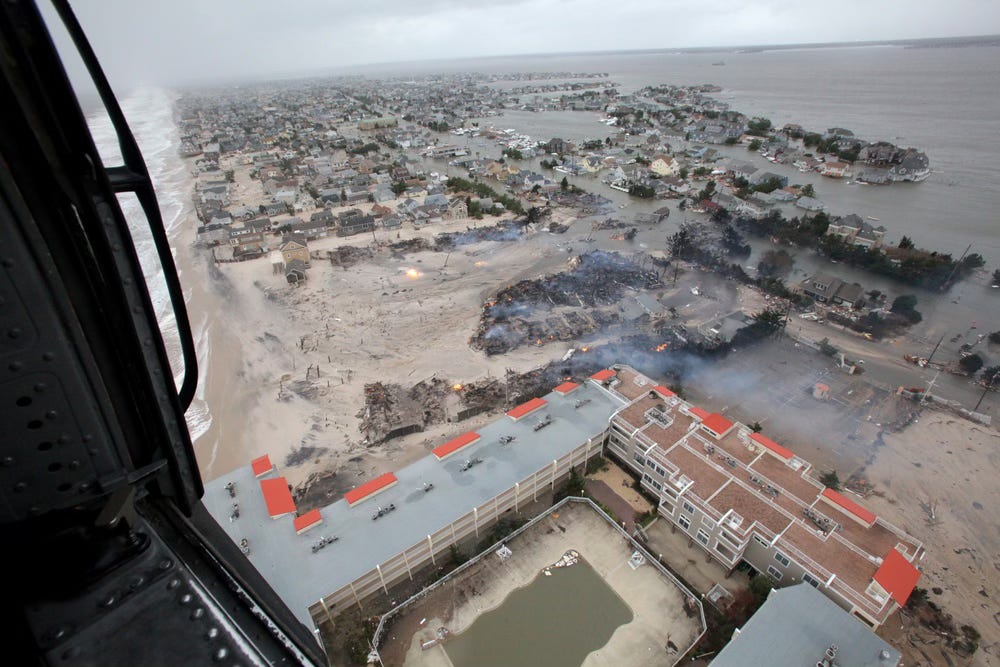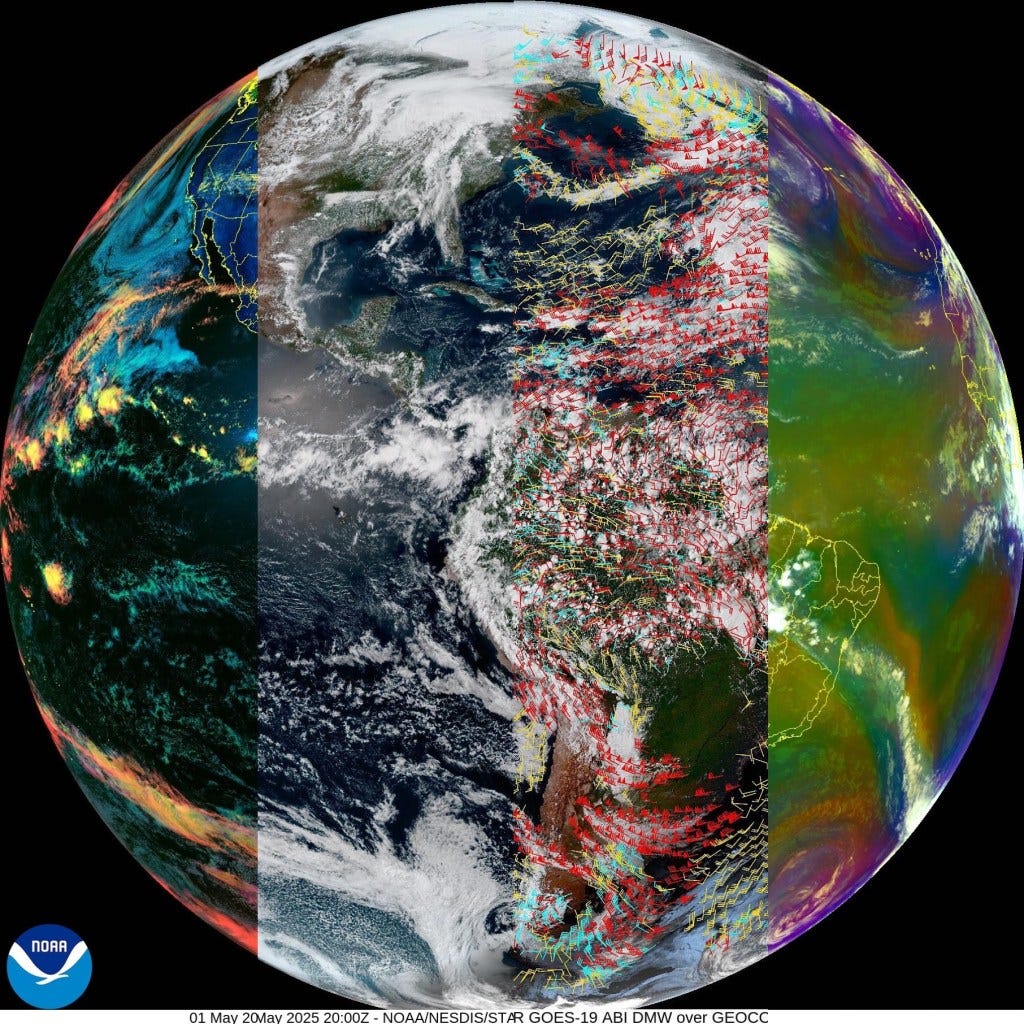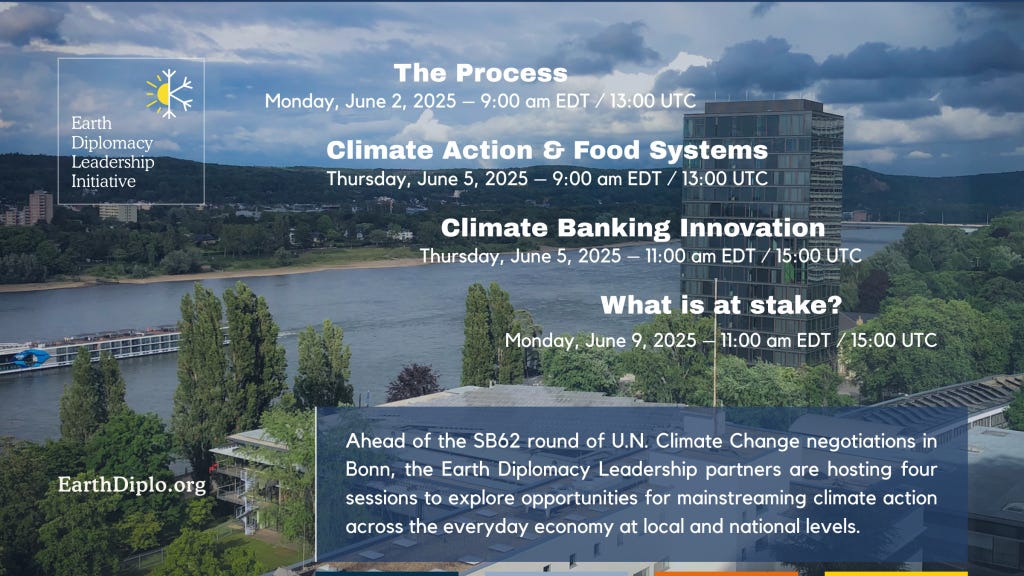SB62 brief: Everyday climate rescue is the future
Climate rescue is the work of preventing & overcoming dangerous industrial climate disruption. Everyday economic activity must support & benefit from this collective problem solving.
A policy brief from Climate Civics and the Climate Value Exchange for negotiators at the SB62 round of United Nations Climate Change negotiations, in Bonn, Germany.
As negotiators gather in Bonn, Germany, for the 62nd meeting of the Subsidiary Bodies of the United Nations Framework Convention on Climate Change (SB62), they will be faced with four haunted realities beyond their immediate control:
Industrial global heating and climate disruption are getting worse, and costs are piling up, fast.
Geopolitical tensions threaten to reverse progress made so far toward a climate-resilient future economy.
The vast majority of climate crisis response actors, a category that extends to all of us, have never been activated.
Everyday climate rescue, through the activity of the mainstream economy, is the future.
The core mandate of the 1992 U.N. Framework Convention on Climate Change is to "prevent dangerous anthropogenic interference with the climate system". Climate rescue is the multifaceted project of achieving a future in which people and ecosystems no longer suffer harm and devastation due to industrial climate disruption.

Those nations that fall behind, or that contribute overwhelmingly to the disruption of Earth systems, and to related costs that fall on others, will see pervasive and accumulating costs in coming decades. The everyday economy, including high-volume trade and finance, will have to manage and allocate responsibility for the rising costs of climate disruption. Brazil’s COP30 President André Corrêa do Lago has warned of a dangerous “economic denialism”, which could prevent the mainstream economy from responding effectively and on time to prevent the catastrophic costs of climate disruption from taking over.
Already, the United States has experienced multiple extreme events each projected to trigger more than $250 billion in total costs over time. These major regional shocks are echoed by local human-scale devastation, like the tragic floods that hit the Nigerian market town of Mokwa in recent days, where at least 200 are confirmed dead and more than 700 are feared dead.
Food systems are a growing concern.
As nature loss and climate breakdown advance, transmission of novel pathogens to new regions and ecosystems, and from wildlife to people, is accelerating.
The H5N1 strain of avian flu is causing such price shocks it is transmitting economic vulnerability across the world, draining resources that should be devoted to addressing vulnerability and fostering cooperative sustainable development.
Mokwa, the Nigerian town affected by catastrophic flooding, is a market town, where farmers bring their produce to sell it into the wider economy. Devastation in such places undermines the integrity and resilience of the overall food systms.
All of these pressures affect not only food production and distribution, but also the ability of governments to invest in preparedness and respond efffectively when shocks occur.
In our review of COP29 outcomes and assessment of progress on Paris Agreement imperatives, we identified three areas where transformational action is possible:
Getting local: Whether in terms of development finance, philanthropy, or foreign direct investment, far more money becomes available if it can go to investable activities outside of government. Governments can address climate change, implement national plans for decarbonization (NDCs) and adaptation (NAPs), grow their economies, and improve lives and livelihoods, by welcoming the Capital to Communities approach.
Moving toward a Zero Harm standard to upgrade ambition at all levels. This will incentivize economy-wide mobilization of resources, across all areas of climate concern—including mitigation, adaptation, resilience, loss and damage, nature-restoration, food systems, capacity-building, technology development and sharing, data-sharing and translation into local services, including the needed expansion of early warning systems.
Treating information as a right: Not only should all people have access to factual information, but communities and nations should benefit from informed decisions based on the best information in existence being applied with genuine interest in everyone’s wellbeing. Without this, all nations will see rapidly worsening climate impacts, costs, and disruptions. Disinformation not only hurts the vulnerable; it also weakens entire nations and undermines leaders’ and negotiators’ ability to secure the best outcome.
The Zero Harm Standard has effectively been established in language of the UAE Consensus, which echoes the Paris Agreement, in recognizing:
the importance of ensuring the integrity of all ecosystems, including in forests, the ocean, mountains, and the cryosphere.
The right to information that is factual, updated, actionable, and untainted, and the need to get local with policy, investments, and innovation, are implicit in this statement of principle, as well. To adequately reduce risk and motivate economy-wide climate-resilient development, all nations need to find ways to act on these priorities, mobilizing, investing in, and benefitting people at all levels of income, in all geophysical conditions.

Three areas of everyday economic activity that allow governments to infuse climate progress into their own policy actions and international relations include:
Food Systems – Because food systems touch all corners of local and national economies, and shape people's days and human interactions, in all societies, and because food prices play a determinant role in overall economic efficiency and opportunity, policy, investment, and innovation that support health-building climate-resilient food systems can build measurable climate value into everyday activities, everywhere.
Banking – For centuries, the banking sector has developed more and more sophisticated ways to secure and move money, for the benefit of depositors and investors, while deriving world-leading profits; now, banks large and small have an opportunity to infuse climate intelligence into their operations, in ways that will allow all people who deal in any amount of currency to add (and be rewarded for adding) climate value to everyday transactions.
Trade and Cooperation – International trade has tended to benefit large transnational actors and large economies, that can leverage scale to extract maximum efficiency gains. Trade relations are opportunities to negotiate evidence-based resilience-focused terms, to support a future economy that is climate-resilient, attuned to fast-paced innovation, and inclusive. Article 6.8 of the Paris Agreement is an opportunity to bring about this better, smarter, more productive and reciprocal trade.

In Bonn, the opportunity to turn these areas of action into areas of everyday investment and local economic activity will run through various overlapping and parallel segments of the negotiations:
Research and systematic observation – SBSTA 62 item 4
Adaptation – SBSTA 62 item 5 and SBI 62 item 11
Adaptation Fund – SBI 62 item 15
Loss and damage – SBSTA 62 item 6 and SBI 62 item 13
Agriculture and food security – SBSTA 62 and SBI 62 item 10
Article 6.8 non-market approaches – SBSTA 62 item 12
Capacity building – SBI 62 item 16
Article 13: Financial and technical support for reporting and capacity-building – SBI 62 item 5
We urge negotiators to consider that while the operational context of the moment is beyond their immediate control, the work taking place now in Bonn can and must set up the COP30 negotiations in Belem, Brazil, later this year, to activate these high-value opportunities for people in all countries. No nation's past dependence on fossil fuels for industrial development or government revenues, no matter how lucrative, is sufficient to overcome the devastating costs of climate breakdown.

The expert group working to distill thousands of suggested adaptation indicators under the UAE-Belém work programme has proposed a consolidated list of 490 indicators across 11 broad areas of concern. The 11 areas are numbered here according to their designations in the formal process (with the number of indicators in each category in parentheses):
9a) Water supply and sanitation (33)
9b) Food and agricultural production (66)
9c) Health impacts and health services (62)
9d) Ecosystems and Biodiversity (40)
9e) Infrastructure and human settlements (99)
9f) Poverty eradication and livelihoods (24)
9g) Cultural heritage and knowledge (63)
10a) Impact, vulnerability, risk assessment (18)
10b) Planning (26)
10c) Implementation (39)
10d) Monitoring, evaluation, and learning (20)
This opens a new practically focused phase in the global project of cooperative climate adaptation, risk reduction, and resilience measures. We encourage national governments to work with stakeholders, including local communities, municipalities and regional governments, and non-governmental actors that can support successful adaptation and resilience measures, to upgrade and activate adaptation plans, in ways that are locally rooted, scalable, and sustainable.
As nations move toward release of their NDC 3.0 updated climate action blueprints, they should work toward Adaptation action agendas that build the zero-harm standard, universal participation, and non-financial climate value into the everyday economy. Doing so would mean:
new and upgraded infrastructure;
climate-smart banking start-ups and expanded commercial banking business models;
diversified economic opportunity in frontline communities and in centers of commerce, whose opportunities will be more connected to each other's operational resilience and related chances of success;
new data systems that support climate value-building policies and ventures, and open a new age of health-building, climate-resilient trade.
The practical benefits of detailed substantive progress toward climate-resilient everyday economies will add up to tens of trillions of dollars in prevented losses and new opportunity. The future security and wellbeing of all nations is at stake. The key to success will be connecting the abstract spaces where text is negotiated to the ability of the everyday economy to reliably deliver climate rescue.



